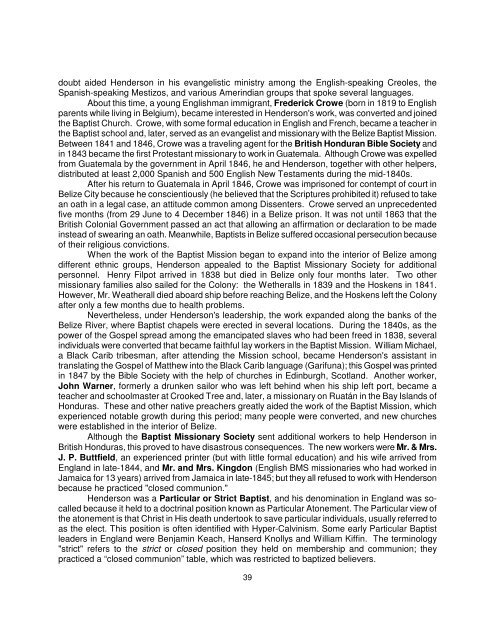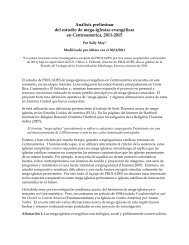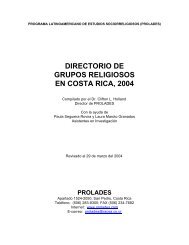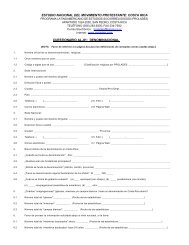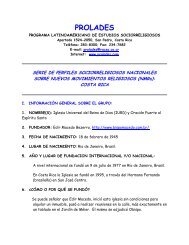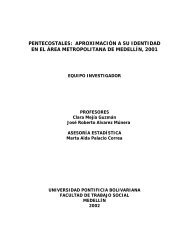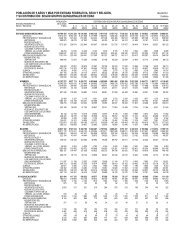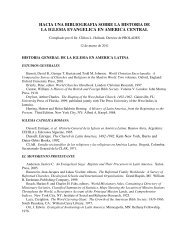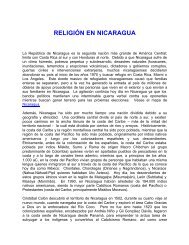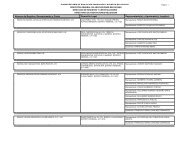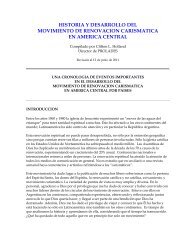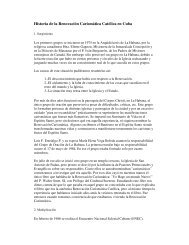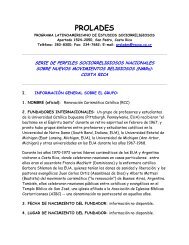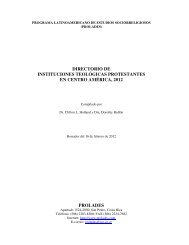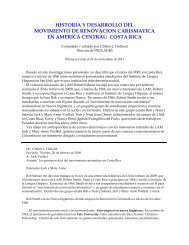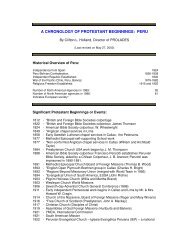belize, 1980 - Prolades.com
belize, 1980 - Prolades.com
belize, 1980 - Prolades.com
Create successful ePaper yourself
Turn your PDF publications into a flip-book with our unique Google optimized e-Paper software.
doubt aided Henderson in his evangelistic ministry among the English-speaking Creoles, the<br />
Spanish-speaking Mestizos, and various Amerindian groups that spoke several languages.<br />
About this time, a young Englishman immigrant, Frederick Crowe (born in 1819 to English<br />
parents while living in Belgium), became interested in Henderson's work, was converted and joined<br />
the Baptist Church. Crowe, with some formal education in English and French, became a teacher in<br />
the Baptist school and, later, served as an evangelist and missionary with the Belize Baptist Mission.<br />
Between 1841 and 1846, Crowe was a traveling agent for the British Honduran Bible Society and<br />
in 1843 became the first Protestant missionary to work in Guatemala. Although Crowe was expelled<br />
from Guatemala by the government in April 1846, he and Henderson, together with other helpers,<br />
distributed at least 2,000 Spanish and 500 English New Testaments during the mid-1840s.<br />
After his return to Guatemala in April 1846, Crowe was imprisoned for contempt of court in<br />
Belize City because he conscientiously (he believed that the Scriptures prohibited it) refused to take<br />
an oath in a legal case, an attitude <strong>com</strong>mon among Dissenters. Crowe served an unprecedented<br />
five months (from 29 June to 4 December 1846) in a Belize prison. It was not until 1863 that the<br />
British Colonial Government passed an act that allowing an affirmation or declaration to be made<br />
instead of swearing an oath. Meanwhile, Baptists in Belize suffered occasional persecution because<br />
of their religious convictions.<br />
When the work of the Baptist Mission began to expand into the interior of Belize among<br />
different ethnic groups, Henderson appealed to the Baptist Missionary Society for additional<br />
personnel. Henry Filpot arrived in 1838 but died in Belize only four months later. Two other<br />
missionary families also sailed for the Colony: the Wetheralls in 1839 and the Hoskens in 1841.<br />
However, Mr. Weatherall died aboard ship before reaching Belize, and the Hoskens left the Colony<br />
after only a few months due to health problems.<br />
Nevertheless, under Henderson's leadership, the work expanded along the banks of the<br />
Belize River, where Baptist chapels were erected in several locations. During the 1840s, as the<br />
power of the Gospel spread among the emancipated slaves who had been freed in 1838, several<br />
individuals were converted that became faithful lay workers in the Baptist Mission. William Michael,<br />
a Black Carib tribesman, after attending the Mission school, became Henderson's assistant in<br />
translating the Gospel of Matthew into the Black Carib language (Garifuna); this Gospel was printed<br />
in 1847 by the Bible Society with the help of churches in Edinburgh, Scotland. Another worker,<br />
John Warner, formerly a drunken sailor who was left behind when his ship left port, became a<br />
teacher and schoolmaster at Crooked Tree and, later, a missionary on Ruatán in the Bay Islands of<br />
Honduras. These and other native preachers greatly aided the work of the Baptist Mission, which<br />
experienced notable growth during this period; many people were converted, and new churches<br />
were established in the interior of Belize.<br />
Although the Baptist Missionary Society sent additional workers to help Henderson in<br />
British Honduras, this proved to have disastrous consequences. The new workers were Mr. & Mrs.<br />
J. P. Buttfield, an experienced printer (but with little formal education) and his wife arrived from<br />
England in late-1844, and Mr. and Mrs. Kingdon (English BMS missionaries who had worked in<br />
Jamaica for 13 years) arrived from Jamaica in late-1845; but they all refused to work with Henderson<br />
because he practiced "closed <strong>com</strong>munion."<br />
Henderson was a Particular or Strict Baptist, and his denomination in England was socalled<br />
because it held to a doctrinal position known as Particular Atonement. The Particular view of<br />
the atonement is that Christ in His death undertook to save particular individuals, usually referred to<br />
as the elect. This position is often identified with Hyper-Calvinism. Some early Particular Baptist<br />
leaders in England were Benjamin Keach, Hanserd Knollys and William Kiffin. The terminology<br />
"strict" refers to the strict or closed position they held on membership and <strong>com</strong>munion; they<br />
practiced a “closed <strong>com</strong>munion” table, which was restricted to baptized believers.<br />
39


